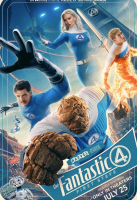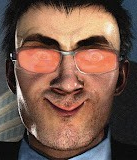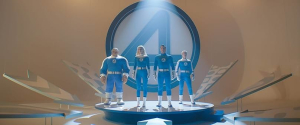
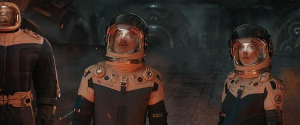
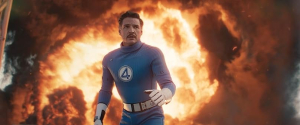
With The Fantastic Four: First Steps, Marvel has not just swung open the doors to Phase Six—it’s flung viewers into a universe bursting with neon-lit ambition, ideals, and emotional honesty. Director Matt Shakman reinvents the rules of MCU storytelling, giving the famous quartet a vibrant retro-futurist sandbox where science, hope, and existential peril intermingle. The result is a superhero film that shuns formula and nostalgia and, in doing so, sets a dazzlingly high bar for team-based blockbusters.
A World Both Familiar and Refreshing
Forget about the gray cityscapes or the washed-out labs of earlier superhero fare. Here, New York gleams with a 1960s energy that never surrendered to cynicism. The Baxter Building isn’t just headquarters—it’s a lighthouse of invention, teeming with activity and technological marvels. Shakman and production designer Kasra Farahani drench scenes in blues, golds, and magentas, crafting an environment where future and past co-exist—and where ordinary citizens look to the Fantastic Four not with fear, but admiration.
This setting isn’t window-dressing; it’s integral. Every scene pulses with the feeling that humanity is riding the crest of a scientific golden age. The Future Foundation is central to this narrative—symbolizing not just the team’s intellect, but their stewardship of discovery. This immediately propels the plot into bigger questions: What do you do when the world’s progress rests on your shoulders? Can optimism survive when the sky fills with threats like Galactus? In this world, invention is as political as it is creative.
Performances That Anchor the Marvelous
Pedro Pascal’s Reed Richards is a departure from the cold super-genius archetype; instead he’s tactile, overwhelmed, and compellingly earnest—a scientist and father who knows that one miscalculation could dim humanity’s brightest hour. Vanessa Kirby’s Sue Storm shines as a leader, not just a complement to Reed; she’s savvy, principled, and haunted by both the promise and pressure of raising a child in a world as fragile as it is wondrous.
Ben Grimm (Ebon Moss-Bachrach) is given his due as the team’s soul. In motion capture and through layers of rock, Moss-Bachrach brings relatable humor, pain, and wisdom to the Thing—his scenes, whether arguing with Johnny or reflecting in solitude, are where the movie’s emotional weight rests. In Joseph Quinn’s hands, Johnny Storm is electrifying—a showman whose brashness obscures a desire for meaningful legacy. Their sibling-esque back-and-forth is sharp, believable, and often laugh-out-loud funny.
Cosmic and Personal: A New Blend of Stakes
Galactus (Ralph Ineson) makes good on decades of anticipation, presented as a cosmic constant, not just a villain-of-the-week. Imposing, regal, and uniquely tragic, he’s a presence felt before he’s ever seen. Julia Garner’s Silver Surfer (Shalla-Bal) zips across the sky like a spectral ghost—her anguish and loyalty to Galactus written in every gesture.
Screenwriters eschew tired assembling the team arcs in favor of mature dilemmas. The Fantastic Four aren’t learning their powers; they’re protecting what their accomplishments have built. It’s from this platform that some of the movie’s most poignant questions emerge: Should Reed and Sue bring a child into a cosmos so unpredictable? What responsibilities do heroes owe to a society that both cheers and depends on them? The film’s action sequences—gravity-defying trips to the Negative Zone, daring dogfights in the skies—are grounded by these very real concerns.
Breathtaking Craft and Subtle Innovation
Shakman and director of photography Jess Hall orchestrate a blend of practical and digital effects, letting audiences feel the cold metal of the Excelsior or the bustling energy on Yancy Street. There’s an intentional tactility: The labs are cluttered with vintage instruments, the suits move naturally, and H.E.R.B.I.E. is rendered with physical stage props, not just CGI.
Michael Giacchino’s musical score is layered, at times playful and at others arrestingly melancholic. Rather than relying on recurring motifs alone, Giacchino reinterprets themes throughout, so that every risk and sacrifice by the team feels earned and resonant.
Conclusion: A Marvel Movie Unlike Any Other
The Fantastic Four: First Steps swings for the fences and lands in territory that’s as inventive as it is heartfelt. Through bold vision, sharply felt ensemble work, and a willingness to defy superhero conventions, it becomes a story not only of crisis and adventure, but of what it truly means to strive for a brighter tomorrow. Whether you watch, stream, or download this adventure online, you’ll find Marvel’s First Family more relevant—and more spectacular—than ever.
How to watch The Fantastic Four: First Steps online
Following its theatrical premiere on July 25, 2025, The Fantastic Four: First Steps will stream on Disney+ for subscribers, with download and offline viewing options. Digital rental and purchase will be available on Amazon Prime Video and Apple TV, and these services will support both streaming and downloads. Later, Hulu and Peacock could add it to their premium libraries. The movie’s initial online release will not be free or unblocked, but various platforms may feature it over time. Its US age rating is PG-13, suited for teens and adults due to sci-fi action and thematic nuance.
Pros
- Universe-building with retro-futurist flair that’s both bold and credible
- Emotionally complex, genuinely fresh main performances
- Galactus and Silver Surfer command awe and dramatic heft
- Family dynamics are nuanced and conflict-rich, never cliché
- Set and prop design bring Marvel’s sci-fi roots thrillingly to life
- Score and sound perfectly mirror the film’s tonal shifts and emotional beats
- Dialogue balances big ideas with accessible, lived-in humor
- Film asks profound questions about heroism and legacy
Cons
- Pacing can slow as movie leans into family and philosophical drama
- Supporting MCU characters are nearly absent, which may frustrate some fans
- Certain villains and sideplots (Mole Man, UN intrigue) fade too quickly
- The alternate-universe context might briefly alienate newcomers to this version of the team
